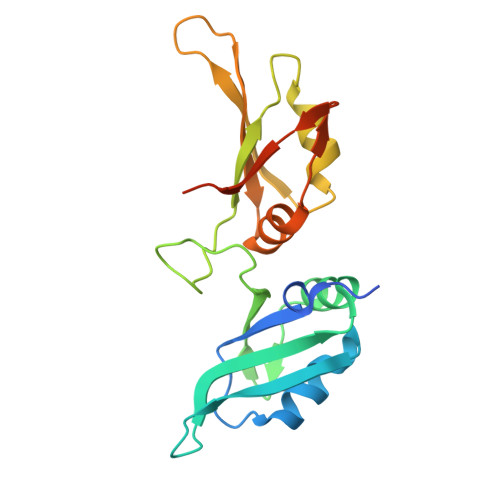Enhanced identification of small molecules binding to hnRNPA1 via cryptic pockets mapping coupled with X-ray fragment screening.
Dunnett, L., Das, S., Venditti, V., Prischi, F.(2025) J Biological Chem 301: 108335-108335
- PubMed: 39984046
- DOI: https://doi.org/10.1016/j.jbc.2025.108335
- Primary Citation of Related Structures:
9F4D, 9F4G, 9F4H, 9F4J, 9F4K, 9F4L, 9F4N, 9F4O, 9F4P, 9F4Q, 9F4R, 9F4S, 9F4T, 9F4U, 9F4V, 9F4W, 9F4X, 9F4Y, 9F4Z, 9F50, 9F51, 9F52, 9F53, 9F54, 9F55, 9F5C, 9F5D, 9F5E, 9F5F, 9F5G, 9F5K, 9F7F, 9F7H, 9HQ9, 9HQJ, 9HQL - PubMed Abstract:
The human heterogeneous nuclear ribonucleoprotein (hnRNP) A1 is a prototypical RNA-binding protein essential for regulating a wide range of post-transcriptional events in cells. As a multifunctional protein with a key role in RNA metabolism, deregulation of its functions has been linked to neurodegenerative diseases, tumor aggressiveness, and chemoresistance, which has fuelled efforts to develop novel therapeutics that modulate its RNA-binding activities. Here, using a combination of molecular dynamics simulations and graph neural network pocket predictions, we showed that hnRNPA1 N-terminal RNA-binding domain (unwinding protein 1 [UP1]) contains several cryptic pockets capable of binding small molecules. To identify chemical entities for the development of potent drug candidates and experimentally validate identified druggable hotspots, we carried out a large fragment screening on UP1 protein crystals. Our screen identified 36 hits that extensively sample UP1 functional regions involved in RNA recognition and binding as well as map hotspots onto novel protein interaction surfaces. We observed a wide range of ligand-induced conformational variation by stabilization of dynamic protein regions. Our high-resolution structures, the first of an hnRNP in complex with a fragment or small molecule, provide rapid routes for the rational development of a range of different inhibitors and chemical tools for studying molecular mechanisms of hnRNPA1-mediated splicing regulation.
- Diamond Light Source Ltd., Harwell Science and Innovation Campus, Didcot, UK.
Organizational Affiliation:

















